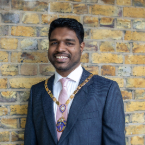Last week, I was part of a roundtable event at the Department for Health and Social Care, representing the RCN alongside our General Secretary and Chief Executive, Nicola Ranger.
I see it as an important part of my role as RCN President to be representing members’ voices at events like these, where the experiences of nursing staff need to be heard.
So, I was particularly delighted that in this meeting with the Health Secretary Wes Streeting, Chief Nursing Officer for England Duncan Burton and Karyn Smith MP, we were joined by a group of RCN members from various nursing specialisms who brought their insight and solutions that could help shape the future of the NHS and social care in England.
The UK government’s ambition is to develop a 10-Year Health Plan to build a health service fit for the future and to meet the changing needs of the population. We’re calling for action from the government ahead of the publication of the plan including a commitment to funding that reflects demand, resolving the nursing workforce crisis, and eradicating corridor care.
The nursing voice must be listened to. I believe our strength lies in our members - over half a million of us - from all levels and layers of professional practice united in the same voice, passion, and commitment to patient care.
That’s what happened at the roundtable, where the power of our collective voice was heard. Our members, who are close to the patients they care for every day, offered practical solutions directly to the Health Secretary, ensuring that the voice from the frontline was heard where it matters most. Hear directly from those members about what they want to see change across health and care.
I used the opportunity to talk about the impact of low pay on the nursing profession – made worse by the increased cost of living and transport costs. I also highlighted the experiences of international nursing staff and shared stories I’ve heard around international nursing staff getting physically abused and who get treated extremely poorly, but fear speaking up. I also raised concerns about how unethically some newly-recruited nurses are treated, especially in adult social care. They often end up paying tens of thousands for visas and then don’t end up with a proper nursing job. These are important issues that need the UK government’s attention.
It was deeply concerning to see the latest figures for applications to study nursing in England and the UK overall fell last week, particularly after the recent news that Cardiff University is consulting on its proposals to stop providing nursing courses at the University, and that in Scotland, applications to nursing courses are at a seven-year low. The decline in applications is extremely worrying for our profession as it means the workforce gap is set to widen even further. Without significant investment in nursing by governments across the UK in higher education, nursing courses and student numbers, and the future nursing workforce, will continue to decline. We’ve called for the UK government to act now and launch an urgent, fully funded student recruitment campaign this spring to turn this situation around before September’s intake.
While there are many challenges in nursing, it is still an incredible profession and I want that message to be heard loud and clear by prospective nursing students of the future.
I am committed to working with members and the College to shape nursing for the future – to make it a profession we are all proud and excited to work in. To demonstrate that our safety-critical profession, when fairly rewarded, improves safe care for patients. And by doing so, encouraging the next generation into nursing and retaining the brilliant nursing staff we already have.
A key opportunity for us to do this is at RCN Congress in May where one of the items we will be debating is what members can do to raise the profile of nursing as a positive career.
I am excited to welcome all of you to congress and look forward to meeting and speaking to many of you there. The agenda is now live, so make sure to book your free place.
A seat at the table: speaking up for change
RCN President Bejoy Sebastian reflects on representing our members at a DHSC roundtable, and the importance of investing in the nursing profession to secure its future.

Bejoy Sebastian
RCN President
Bejoy Sebastian is a senior nurse working in critical care at University College London Hospitals NHS Foundation Trust. He has previously held a number of positions at Imperial College Healthcare NHS Trust. Hailing from Kerala, he arrived in the UK in March 2011 after finishing his nursing studies at Kottayam Medical College.
He was the Chair of the International Nursing and Midwifery Association network UK, where he has raised the profile of internationally educated nursing staff, helping them thrive in their careers and identifying the barriers they face in the workplace. He was also the founding General Secretary of the Alliance of Senior Kerala Nurses. He is an active volunteer for DKMS and with the help of Upahaar UK has organised numerous stem cell donor registration drives from global majority backgrounds to reduce the health inequities faced by them.
He began his role as RCN President in January 2025 and will serve for two years.
Page last updated - 03/03/2025

 Share on LinkedIn
Share on LinkedIn




